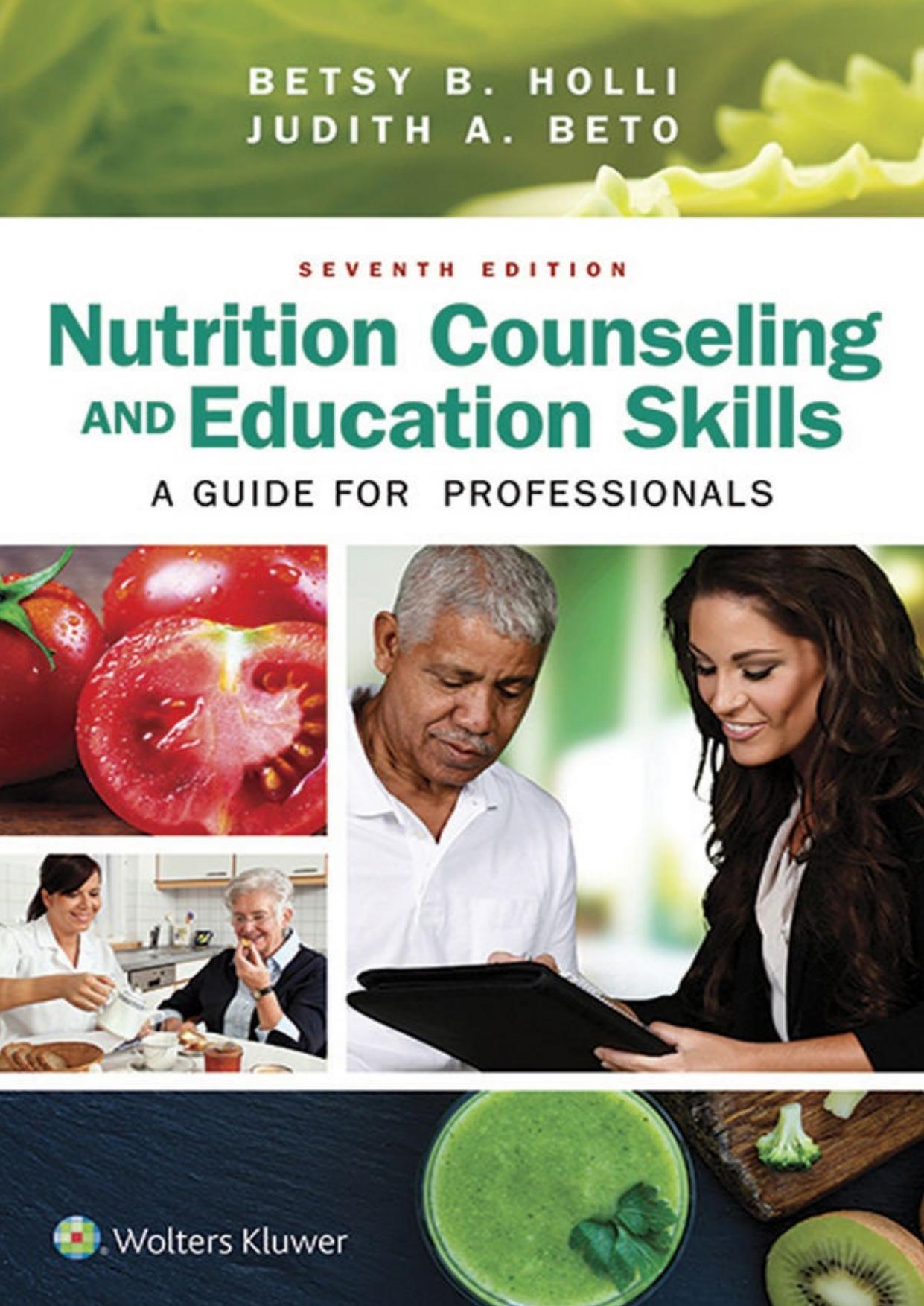Nutrition Counseling and Education Skills A Guide for Professionals 7th edition by Betsy Holli, Judith Beto ISBN 1284456889 9781284456882
$70.00 Original price was: $70.00.$35.00Current price is: $35.00.
Instant download Nutrition Counseling and Education Skills A Guide for Professionals 7th after payment
Nutrition Counseling and Education Skills A Guide for Professionals 7th edition by Betsy Holli, Judith Beto – Ebook PDF Instant Download/Delivery: 1284456889, 9781284456882
Full download Nutrition Counseling and Education Skills A Guide for Professionals 7th edition after payment

Product details:
ISBN 10: 1284456889
ISBN 13: 9781284456882
Author: Betsy Holli, Judith Beto
Now in vibrant full color, this updated Seventh Edition of Holli’s best-selling Nutrition Counseling and Education Skills: A Guide for Professionals helps students develop the communications, counseling, interviewing, motivational, and professional skills they’ll need as Registered Dietitian professionals. Throughout the book, the authors focus on effective nutrition interventions, evidence-based theories and models, clinical nutrition principles, and knowledge of behavioral science and educational approaches. Packed with activities, case studies, and self-assessment questions, the Seventh Edition features new content that reflects the latest changes in the field, new online videos that bring nutrition counseling techniques to life, and a powerful array of new and enhanced in-text and online learning tools.
Nutrition Counseling and Education Skills A Guide for Professionals 7th Table of contents:
Chapter 1: Expanding Scope of Nutrition Practice
-
Introduction: Overview of nutrition practices.
-
Origin of Food Habits or Behaviors: Understanding the roots of food habits.
-
Government Public Health Initiatives: Public health efforts that influence nutrition.
-
Food and Health Survey Results: How food habits and health are tracked through surveys.
-
Scope of Practice Framework: Defining the boundaries and roles in nutrition practice.
-
Nutrition Care Process: Overview of the process for assessing and intervening in nutrition.
-
Evolving Scope of Practice in Nutrition: How the field of nutrition is changing and expanding.
Chapter 2: Communication
-
Introduction: Basics of communication in nutrition practice.
-
Communication Defined: Definition of communication in professional contexts.
-
Interpersonal Communication Model: Understanding the dynamics between communicators.
-
Verbal and Nonverbal Communication: Differentiating between spoken words and non-verbal cues.
-
Diversity: How cultural diversity influences communication.
-
Listening Skills: The importance of active listening in effective communication.
Chapter 3: Interviewing
-
Introduction: Basics of interviewing in nutrition.
-
Nutrition Interviews: Specifics of conducting nutrition-related interviews.
-
Preemployment Interviews: What to expect and prepare for in job interviews.
-
Conditions Facilitating Interviews: Factors that make interviews more effective.
-
Parts of the Interview: Structure and key components of an interview.
-
Responses: How to respond appropriately in interviews.
-
Closing the Interview: Best practices for concluding an interview.
Chapter 4: Communication and Cultural Competence
-
Introduction: Overview of communication in diverse cultural settings.
-
Cultural Diversity: Understanding different cultures and their perspectives on nutrition.
-
Cultural Processes: How culture affects food choices and nutrition practices.
-
Diversity in the Workplace: How diversity impacts communication and interactions in professional settings.
-
Cultural Competence Models: Frameworks for developing cultural competence in nutrition practice.
-
Cultural Competence in Counseling: Applying cultural competence in nutrition counseling.
-
Limited Literacy: Addressing challenges related to low literacy in nutrition education.
Chapter 5: Stages and Processes of Health Behavior Change
-
Introduction: Overview of health behavior change models.
-
Transtheoretical Model/Stages of Change: Understanding the stages individuals go through in behavior change.
-
Stages of Change: In-depth exploration of the stages in the Transtheoretical Model.
-
Processes of Change: Strategies for facilitating change during each stage.
-
Decisional Balance: Weighing the pros and cons of changing behavior.
-
Self-efficacy: Building confidence in one’s ability to change behavior.
-
Goal Setting: How to set goals that lead to successful behavior change.
-
Nutrition Intervention: Specific interventions to support behavior change.
-
Nutrition Monitoring and Evaluation: Tracking progress and evaluating the success of interventions.
-
Documentation: Importance of documenting progress in behavior change.
-
Electronic Communication: Using digital tools to support behavior change.
Chapter 6: Person-Centered Counseling
-
Introduction: Overview of counseling approaches in nutrition.
-
Using Theories and Models: Applying various theories to enhance counseling.
-
Nondirective Counseling: A client-centered, non-directive approach.
-
Motivational Interviewing: Using motivational interviewing techniques to facilitate behavior change.
-
Applications: Practical application of person-centered counseling methods.
-
Motivation: Understanding and leveraging motivation in counseling.
-
Goal Setting: Goal setting in person-centered counseling.
-
Health Belief Model: Understanding how beliefs influence health behaviors.
-
Directive Counseling: A more structured, directive approach to counseling.
Chapter 7: Counseling for Behavior Modification
-
Introduction: Overview of behavior modification in nutrition counseling.
-
Classical Conditioning: Using learning principles to modify behavior.
-
Operant Conditioning: Reinforcing desired behaviors and discouraging undesired ones.
-
Modeling: Using role models or examples to teach behavior.
-
Changing Eating Behaviors: Applying behavior modification techniques to eating habits.
-
Self-Monitoring: Encouraging clients to track their behaviors for self-awareness.
-
Self-Management: Teaching clients how to manage their behaviors independently.
-
Social Support: The role of social networks in behavior change.
-
Applications: Real-life applications of behavior modification in nutrition counseling.
Chapter 8: Counseling for Cognitive Change
-
Introduction: Overview of cognitive-based counseling techniques.
-
Cognitive-Behavioral Therapy: Using CBT to address unhealthy thought patterns affecting eating behavior.
-
Cognitions: How thoughts influence behavior and eating habits.
-
Self-Efficacy: How cognitive strategies can improve self-efficacy.
-
Relapse Prevention: Strategies for maintaining behavior change long-term.
-
Models and Theories of Change: Various cognitive models used in nutrition counseling.
Chapter 9: Counseling Through the Life Span
-
Introduction: Counseling approaches for different life stages.
-
Prenatal and Pregnant Women: Nutrition counseling for expecting mothers.
-
Infants up to 2 Years of Age: Nutrition counseling for infants.
-
Preschool Children, Age 2 to 5 Years: Strategies for counseling young children.
-
School-Age Children, Age 6 to 12 Years: Approaches for counseling school-age children.
-
Adolescents, Age 13 to 19 Years: Addressing the unique challenges in counseling teens.
-
Family Counseling: Working with families to improve nutrition and behavior.
-
Adults, Age 20 to 64 Years: Counseling for adults.
-
Adults, Age 65 Years and Older: Nutrition counseling for older adults.
-
Managing Chronic Diet-Related Diseases: Counseling for individuals with chronic diseases.
Chapter 10: Principles and Theories of Learning
-
Introduction: Foundations of learning theory in the context of nutrition education.
-
Learning: How people learn and the role of education in behavior change.
-
Behavioral Learning Theories: Theories explaining how behavior is learned.
-
Social Cognitive Theory: How observation and social interaction influence learning.
-
Cognitive Theories: Understanding how cognition plays a role in learning.
-
Memory: How memory affects learning and retention.
-
Transfer of Learning: Applying learning from one context to another.
-
Andragogy: The study of adult learning principles.
-
Learning Styles and Teaching Styles: Adapting to different learning preferences.
-
Diffusion of Innovations: How new ideas spread and influence behavior.
-
Technology as a Learning Tool: Using technology in nutrition education.
Chapter 11: Planning Learning
-
Introduction: Overview of the planning process for educational activities.
-
Environment for Teaching and Learning: Creating the optimal environment for learning.
-
Steps to Effective Education: Key steps in developing an educational program.
-
Conducting a Needs Assessment: Assessing the needs of learners.
-
Developing Performance Objectives: Setting clear, measurable goals for learning.
-
Domains of Learning: Understanding the different areas of learning.
-
Determining the Content of Learning Plans: Structuring educational content effectively.
-
Organizing Learning Groups: How to group learners for optimal learning.
Chapter 12: Implementing and Evaluating Learning
-
Introduction: Effective implementation and evaluation of learning activities.
-
Selecting Techniques and Methods: Choosing the best teaching methods.
-
Techniques for Different Domains of Learning: Tailoring methods to different learning domains.
-
Task Analysis: Breaking down tasks for teaching and learning.
-
Job Instruction Training: Techniques for training in the workplace.
-
Sequence of Instruction: Structuring the order of lessons for maximum effectiveness.
-
Evaluation of Results: Measuring the success of educational interventions.
-
Types of Evaluation and Outcomes: Different types of evaluations and how to interpret them.
-
Data Collection Techniques: Methods for collecting data on learner progress.
-
Reliability and Validity: Ensuring reliable and valid results.
-
Lesson Plans and Program Plans: Developing detailed plans for teaching.
-
Documentation: Keeping records of learning activities and outcomes.
Chapter 13: Delivering Oral Presentations
-
Introduction: Preparing for and delivering effective presentations.
-
Preparation of an Effective Presentation: Steps to create a successful presentation.
-
Components of an Effective Presentation: Key elements of a presentation.
-
Implementation of an Effective Presentation: Delivering the presentation with impact.
-
Evaluation Methods: How to evaluate the success of presentations.
-
Adaptations: Adjusting presentations to meet the needs of different audiences.
Chapter 14: Using Instructional Media
-
Introduction: The role of visual and instructional media in learning.
-
Benefits of Visual Media: How visual tools enhance learning.
-
Planning Use of Visual Media: Effective use of media in educational settings.
-
Art and Design Principles: Basic principles of design in instructional media.
-
Asynchronous or Synchronous Learning: Differences between online and in-person learning.
-
Types of Visual Media: Exploring different types of media.
-
Numeracy and Literacy Considerations: Considering learners’ literacy and numeracy levels.
-
Purchasing Prepared Media Materials: How to select pre-made media for teaching.
Chapter 15: Facilitating Group Learning
-
Introduction: Understanding the dynamics of group learning.
-
Groups and Teams Defined: Differentiating between groups and teams.
-
Stages of Group Development: Understanding the stages groups go through as they develop.
-
Characteristics of Group and Team Dynamics: Key features of how groups function.
-
Groupthink: The negative effects of groupthink in decision-making.
-
Group and Team Leadership: Leadership strategies for managing groups and teams.
-
Characteristics of an Effective Team: Traits of high-functioning teams.
-
Managing Small Groups and Teams: Techniques for managing small group dynamics.
-
Group Facilitation Skills: Skills needed for facilitating group learning.
-
Facilitator and Participant Functions and Roles: Defining roles in group learning.
-
Paradox of Group Dynamics: Balancing individual and group needs.
-
Problem Solving and Decision Making: How groups solve problems and make decisions.
-
Meetings as a Function of Group Dynamics: Running effective meetings in group settings.
Appendix and Index
-
References: List of sources and additional reading.
-
Index: Easy navigation of key terms and concepts.
People also search for Nutrition Counseling and Education Skills A Guide for Professionals 7th:
nutrition counseling and education skills a practical guide 8th edition
nutrition counseling and education skills a practical guide 8th ed
nutrition counseling and education skills 8th edition
nutrition counseling and education skills a practical guide eighth edition
nutrition counseling vs education
Tags:
Betsy Holli,Judith Beto,Nutrition Counseling,Education Skills


